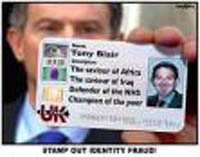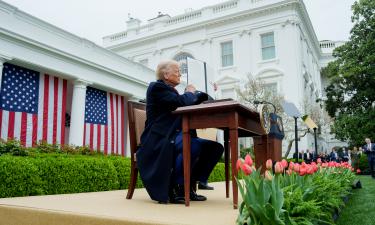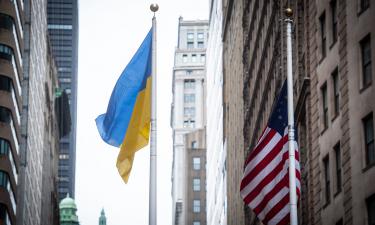National ID cards win or not in Britain?
Government ministers scrambled for support Monday ahead of a House of Commons vote on whether national ID cards should be compulsory. Prime Minister Tony Blair, who has made the identity card plan a centerpiece of the government's efforts to combat terrorism, had intended to return from a summit in South Africa to vote for the plan but was delayed by a problem with his aircraft. Last month, with Blair abstaining, the government was defeated by a single vote on an amendment to legislation banning the incitement of religious hatred.

A close vote was expected in the Commons on the ID cards bill, after the House of Lords inserted an amendment to make the controversial cards voluntary instead of mandatory.
The government offered its own amendment which would require new legislation before it would become compulsory to record data on a national database. Initially, only people getting a new passport or renewing one would be obliged to have their details recorded.
"The government is trying to persuade people to believe it's a voluntary scheme but if you apply for a passport or a renewal, you are required to purchase one. So that's not voluntary at all," said Doug Jewel of Liberty, a civil rights group which organized a protest outside Parliament Monday.
Phil Booth, coordinator of the NO2ID campaign, said people would be required to provide information in 52 categories. "The home secretary (Charles Clarke) does not even believe ID cards could have stopped the (July 7 transport) attacks because the bombers had proper identification and made no attempt to hide their identity," Booth said.
David Davis, the opposition Conservative Party spokesman on law and order, complained that the government had not produced estimates of the cost of introducing the cards. "If this ID card system is going to improve security, we would have supported it. The indications are it is not going to do that at all," Davis said.
"We could use the 15 billion (pounds) or 18 billion (pounds) on many other things, border security, MI5, MI6 or a whole series of things which we won't be able to do because we won't have the money," he said in an interview with British Broadcasting Corp. radio. MI6 is Britain's foreign intelligence agency, while MI5 is the domestic intelligence service.
Davis added that the government's intention was clearly to make the cards compulsory at some time. "The idea that you can't leave the country without having your name put on a national identity register is an interesting idea of voluntary," Davis said. "We want to make it really voluntary. This is a creeping compulsion."
Treasury chief Gordon Brown, however, said the "central issue here is the right to your own identity, that your identity should be secure and it shouldn't be stolen and it should be protected." Brown told the BBC that biometric systems were increasingly being used by banks and credit card issuers to ensure security. "I think people generally accept that for entry to the country with passports, it is right to use the most modern and sophisticated and secure means of identity," he said.
Lord Phillips, a Liberal Democrat who led opposition to the bill in the House of Lords, said the bill was "littered with problems: trust problems, security problems, compulsion problems. It's going to undermine the relationship between the state and the citizen, which is already weakened and mistrustful", reports the AP.
N.U.
Subscribe to Pravda.Ru Telegram channel, Facebook, RSS!





